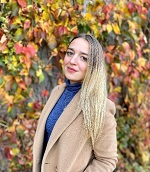Course Report
Research course in translational radiation biology - PDF Version
8-11 November 2020, online.
Course directors
- Martin Pruschy, biologist, University Hospital Zürich, Zürich, Switzerland
- Marie-Catherine Vozenin, biologist, Centre Hospitalier Universitaire Vaudois, Lausanne, Switzerland
Could you please briefly introduce yourself?
My name is Olga Zlygosteva and I am a PhD research fellow at the Department of Physics, University of Oslo, Norway. I work in the biophysics and medical physics group.
Why did you choose to attend this course?
My supervisor suggested taking this course as I am currently working on an interdisciplinary project in close collaboration with biologists, oncologists and psychologists. We have various in vitro and in vivo experiments, so the important questions that we need to answer are: how can we translate our research and results to the clinics? and how do we include translational aspects in planning?
What aspects of the course were the most interesting and why?
The most interesting aspects for me were the radio-immunology, ultra-high dose rate radiation delivery (FLASH) and tumour microenvironment parts. These topics are of current interest as they are innovative and developing.
Did the course activities improve your knowledge and skills in the relevant subject?
During the course, we had three types of activities: lectures, morning Q&A sessions with material revision and group tutorials. These different activities enabled us not only to gain knowledge, but also to use it in reasoning during group discussions. The morning revision provided a nice overview of the previous day and summarised the most relevant key points.
Did the course meet your expectations? If so, how?
This course met my expectations. Organising a digital course is a tricky task as it can be difficult to keep the attention of the attendees for many hours and to create an interactive environment, but this course had an optimal schedule with enough breaks as well as a fruitful and friendly atmosphere that encouraged interactions.
The lectures were presented by the experts in a clear and structured way with both theoretical background and experimental data. The lectures on topics that were not my main interest managed to induce curiosity to participate in the tutorial and to broaden my knowledge.
I would like to get more knowledge on normal tissue responses, so maybe this can be considered as an additional topic for a future course as this year’s course was focused on radioimmunotherapy.
List three important ‘takeaways’ following the course.
The most important ‘takeaways’ from the course were taking into account:
- the relationship between the radiobiological determinants and hallmarks of cancer;
- the influence of the tumour microenvironment on the radiation response;
- whether planned experiments have the potential to be translated to the clinics.
How will what you have learnt be implemented in your daily job/ clinical practice? (if applicable)
The model that was demonstrated regarding the planning of the experiments can be directly implemented in my current work.
How would you encourage someone who has never been to a European SocieTy for Radiotherapy and Oncology course to join this course next year/ in two years?
I would show them the variability of activities that are offered on the course as well as the list of teachers and their expertise. Undoubtedly, the physical event gives an additional exclusive opportunity for participants to get some opinions on their research questions as well as to share experiences with both the experts and other participants.

Olga Zlygosteva
PhD research fellow
University of Oslo
Oslo, Norway
olga.zlygosteva@fys.uio.no